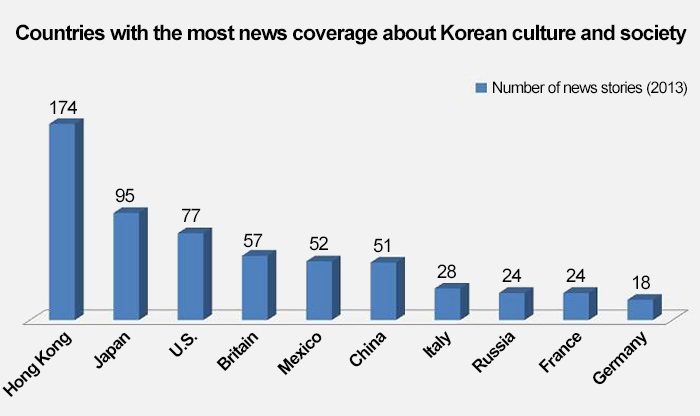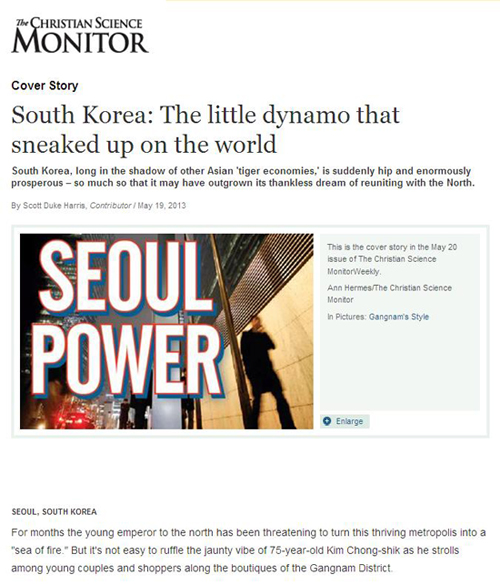The year 2013 saw a continued rise in news stories spotlighting hallyu, also known as “the Korean Wave,” in media outlets worldwide.
According to the Korean Culture and Information Service (KOCIS), part of the Ministry of Culture, Sports and Tourism (MCST), the number of foreign news stories about Korean culture doubled last year compared to the previous year.
The organization has also noted that the attention received by hallyu was no longer limited to Asian nations. Latin American nations, such as Mexico and Argentina, and even European countries, including Italy, France and Germany, have been drawn to “things Korean.”

Korea emerges as a “trendsetter”
Russkiy Reporter, a Russian-language current affairs weekly, released an article on May 11 last year under the lead, “Korea grows from 'an economic power' of the late 20th century into 'a cultural stronghold,' with hallyu and pop culture leading the way, beyond Asia to the world.”
Meanwhile, The Christian Science Monitor, a U.S. daily, in its May 19 article “South Korea: The little dynamo that sneaked up on the world” said that, “While the Korean Wave exports K-pop and TV and film dramas far and wide, the rest of South Korea Inc. keeps cranking out computer chips, smart phones, TVs and autos.”
Korea, it said, has become a trendsetter, with hallyu spreading globally and winning fans in Europe, the Americas and the Arab World.

Hallyu expands its base
The year 2013 saw a significant three- or four-fold increase in the number of news stories reporting on traditional Korean culture, such as traditional cuisine and the Korean alphabet, Hangeul, and on new forms of Korean fashion, literature and traditional music.
Worldwide attention on Korean cuisine has spiked up, especially since U.S. First Lady Michelle Obama posted a photo of some kimchi she personally made and the recipe she used in her Twitter feed. Also, kimchi and the culture of kimchi-making were listed by UNESCO as one of humanity’s intangible cultural heritage items last year.
The Independent, a British daily, published an article on November 17, 2013, titled “Kimchi has gone from the most unpopular Asian food into the one capturing everyone’s taste buds.” British demand for Korean cuisine, it said, has now hit a “phenomenal record.”
Hong Kong’s U-Magazine also reported that, “Hallyu now enjoys its heyday in Hong Kong. Korean food, not to mention K-pop and Korean dramas, has become ‘sensationally popular’ across Hong Kong,” in its April 24 article “The Wave of K-pop, K-food.”
Korea as a top tourist attraction
Last year was also marked by a rise in the number of news stories introducing Korea as one of the best tourist destinations, using phrases like “the old and the new in great harmony.”
The Pragmatica, an Italian international periodical, described in its February issue last year that, “Korea preserves traditional palaces in the heart of its capital, Seoul, where tourists simultaneously enjoy its history and its modernized transformation over the past one thousand years.”
“As traditional palaces and state-of-the-art buildings coexist in Seoul, traveling across the city feels like passing through ‘the sands of time,’” reported La Prensa, a Panamanian newspaper, on June 20, 2013. The article also said that, “When I [the writer] arrived, the city remained tranquil even amid mounting tension between the two Koreas, and it was the safest nation in the world I had ever visited, I think.”
KOCIS predicts that 2014 will be another great year for Korean news stories around the world.
By Sohn JiAe
Korea.net Staff Writer
jiae5853@korea.kr
According to the Korean Culture and Information Service (KOCIS), part of the Ministry of Culture, Sports and Tourism (MCST), the number of foreign news stories about Korean culture doubled last year compared to the previous year.
The organization has also noted that the attention received by hallyu was no longer limited to Asian nations. Latin American nations, such as Mexico and Argentina, and even European countries, including Italy, France and Germany, have been drawn to “things Korean.”
The chart shows locations with the most news coverage about Korean culture and society. (Photo: the KOCIS)
Korea emerges as a “trendsetter”
Russkiy Reporter, a Russian-language current affairs weekly, released an article on May 11 last year under the lead, “Korea grows from 'an economic power' of the late 20th century into 'a cultural stronghold,' with hallyu and pop culture leading the way, beyond Asia to the world.”
Meanwhile, The Christian Science Monitor, a U.S. daily, in its May 19 article “South Korea: The little dynamo that sneaked up on the world” said that, “While the Korean Wave exports K-pop and TV and film dramas far and wide, the rest of South Korea Inc. keeps cranking out computer chips, smart phones, TVs and autos.”
Korea, it said, has become a trendsetter, with hallyu spreading globally and winning fans in Europe, the Americas and the Arab World.
A captured image from The Christian Science Monitor’s “South Korea: The little dynamo that sneaked up on the world” article published on May 20 last year.
Hallyu expands its base
The year 2013 saw a significant three- or four-fold increase in the number of news stories reporting on traditional Korean culture, such as traditional cuisine and the Korean alphabet, Hangeul, and on new forms of Korean fashion, literature and traditional music.
Worldwide attention on Korean cuisine has spiked up, especially since U.S. First Lady Michelle Obama posted a photo of some kimchi she personally made and the recipe she used in her Twitter feed. Also, kimchi and the culture of kimchi-making were listed by UNESCO as one of humanity’s intangible cultural heritage items last year.
The Independent, a British daily, published an article on November 17, 2013, titled “Kimchi has gone from the most unpopular Asian food into the one capturing everyone’s taste buds.” British demand for Korean cuisine, it said, has now hit a “phenomenal record.”
Hong Kong’s U-Magazine also reported that, “Hallyu now enjoys its heyday in Hong Kong. Korean food, not to mention K-pop and Korean dramas, has become ‘sensationally popular’ across Hong Kong,” in its April 24 article “The Wave of K-pop, K-food.”
Korea as a top tourist attraction
Last year was also marked by a rise in the number of news stories introducing Korea as one of the best tourist destinations, using phrases like “the old and the new in great harmony.”
The Pragmatica, an Italian international periodical, described in its February issue last year that, “Korea preserves traditional palaces in the heart of its capital, Seoul, where tourists simultaneously enjoy its history and its modernized transformation over the past one thousand years.”
“As traditional palaces and state-of-the-art buildings coexist in Seoul, traveling across the city feels like passing through ‘the sands of time,’” reported La Prensa, a Panamanian newspaper, on June 20, 2013. The article also said that, “When I [the writer] arrived, the city remained tranquil even amid mounting tension between the two Koreas, and it was the safest nation in the world I had ever visited, I think.”
KOCIS predicts that 2014 will be another great year for Korean news stories around the world.
By Sohn JiAe
Korea.net Staff Writer
jiae5853@korea.kr